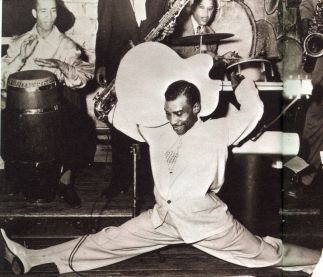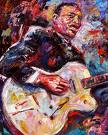T-BONE
Aug 24, 2002
I’ve been able to see the
performances of hundreds of great blues men and women over the years and I
consider myself lucky to have experienced so many great shows, so many good
times. But now and then I wish I had seen some of the blues greats who passed on
before I got a chance to see them, artists like Howlin’ Wolf, Little Walter,
Big Bill Broonzy, Charlie Patton, and Lonnie Johnson.
 The man I’d most like to have
seen is T-Bone Walker. Not only was he the man who gets most of the credit for
turning the guitar into a lead and solo instrument, he was also an outstanding
visual performer. Most of the tricks you see guitarists do now—playing behind
their back, with their teeth, upside down—all came from T-Bone.
The man I’d most like to have
seen is T-Bone Walker. Not only was he the man who gets most of the credit for
turning the guitar into a lead and solo instrument, he was also an outstanding
visual performer. Most of the tricks you see guitarists do now—playing behind
their back, with their teeth, upside down—all came from T-Bone.
His real name was Aaron Thibeau
Walker, but everybody called him T-Bone. He grew up around Dallas and used to
dance on street corners with his cousin Ellie Mae to pick up spare change. His
mama played the guitar and his stepfather played bass fiddle with the Dallas
String Band,
Leadbelly was a friend of the family. Sometimes he'd come by and jam with
T-Bone's mom. Another family friend was Blind Lemon Jefferson. Lemon needed
someone to help him get around and he asked T-Bone to be his lead boy, so T-Bone
guided him around Dallas, mostly down on Central Avenue, where Blind Lemon would
play for coins and whatever.
T-Bone learned to play the ukelele and the banjo, and then he made himself a
guitar out of a cigar box and some nails and wire. Before long, he acquired a
real guitar and got a job with Dr. Breeding's Traveling Medicine Show, peddling
an evil-tasting, black elixir with very high alcohol content. When the electric
amplifier was invented, T-Bone was one of the first guitar players to try it
out. He was also one of the first to play single-string leads on an amplified
guitar.
In 1929, Walker made his recording debut with a single 78 for Columbia,
"Wichita Falls Blues," and "Trinity River Blues." He was
listed on the label as "Oak Cliff T-Bone." T-Bone acquired quite a
taste for liquor and gambling as he played the bars and work camps in Texas.
More than once, he hocked his guitar to get enough cash for a bottle and a crap
game.
During the '30s, T-Bone began to
develop a smoother, more sophisticated blues sound. He split from Texas
for Los Angeles, getting a job right away as a dancer and then as a vocalist
with Les Hite's popular band. He recorded "T-Bone Blues" with the Hite
band for Varsity Records in 1940. His vocals were as smooth as his guitar solos
and he was billed for a time as "The World's Greatest Blues Singer ".
 In
the mid 40s T-Bone recorded what most fans consider some of his best sides for
Black and White Records (later bought out by Capitol), including the
immortal "Call It Stormy Monday (But Tuesday's Just as Bad). In 1950, he
signed with Imperial Records, where he recorded many classics, now available on
a 3-disc set. T-Bone switched to Atlantic Records in 1955. He recorded several
albums in Europe in the'60s, during
tours with The American Folk Festival. His appearances on the first DVD of that
historic festival, although short, are worth the price of the album. Late in his
career, he recorded other LPs for Verve, Bluesway and Polydor labels.
In
the mid 40s T-Bone recorded what most fans consider some of his best sides for
Black and White Records (later bought out by Capitol), including the
immortal "Call It Stormy Monday (But Tuesday's Just as Bad). In 1950, he
signed with Imperial Records, where he recorded many classics, now available on
a 3-disc set. T-Bone switched to Atlantic Records in 1955. He recorded several
albums in Europe in the'60s, during
tours with The American Folk Festival. His appearances on the first DVD of that
historic festival, although short, are worth the price of the album. Late in his
career, he recorded other LPs for Verve, Bluesway and Polydor labels.
Other
film records of T-Bone are few and far between. He appeared once on the Ed Sullivan
Show in the early
50’s. BBC-TV broadcast “Not Only But Also” featuring our man in 1965. They
also televised some filmed concerts including Jazz at the Philharmonic, which
featured T-Bone and others, but the shows aren’t listed in the BBC-TV
archives.
T-Bone appeared at the Monterey
Jazz Festival in 1967—(the famous one, with Jimi and Janis, etc.,) and that
was aired on PBS. In 1968, T-Bone was filmed performing at the American Folk
Blues Festival in Europe. Another PBS appearance was on the Homewood Show with
Johnny Otis in 1970. Seems like there should be a copy of that around. Then,
there’s the French film, “Jazz
Odyssey,” that features T-Bone and one last appearance on television on the
Mike Douglas Show in 1972.
Words cannot really convey the monumental importance of T-Bone Walker's
contributions to the blues. More than anyone else, he created modern blues. He
was the blues' first true lead guitarist and is still ranked as one of
its best. No blues collection is complete without some T-Bone. Next time you're
in a club and the band plays "T-Bone Shuffle," get up and dance while
you listen to T-Bone's lyrics:
"Let your hair down baby, 'n'
let's have a natural ball
Cause when you're not happy, it ain't
no fun at all
You can't take it with you, that's one
thing for sure
There's nothing wrong with you baby,
that a good T-Bone shuffle can't cure."
 The man I’d most like to have
seen is T-Bone Walker. Not only was he the man who gets most of the credit for
turning the guitar into a lead and solo instrument, he was also an outstanding
visual performer. Most of the tricks you see guitarists do now—playing behind
their back, with their teeth, upside down—all came from T-Bone.
The man I’d most like to have
seen is T-Bone Walker. Not only was he the man who gets most of the credit for
turning the guitar into a lead and solo instrument, he was also an outstanding
visual performer. Most of the tricks you see guitarists do now—playing behind
their back, with their teeth, upside down—all came from T-Bone. In
the mid 40s T-Bone recorded what most fans consider some of his best sides for
Black and White Records (later bought out by Capitol), including t
In
the mid 40s T-Bone recorded what most fans consider some of his best sides for
Black and White Records (later bought out by Capitol), including t